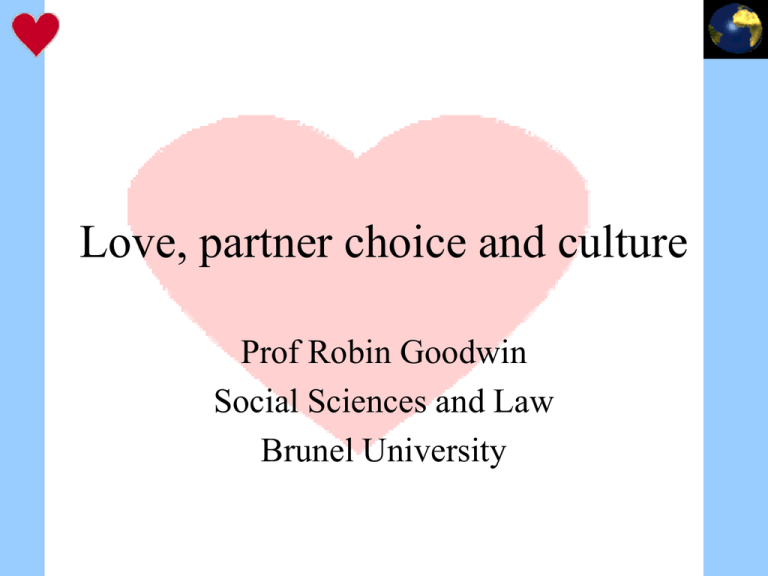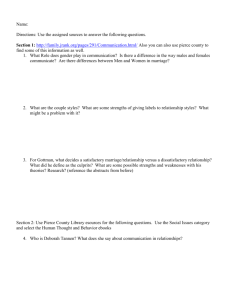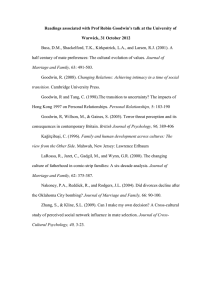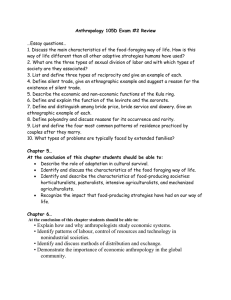Love, partner choice and culture Prof Robin Goodwin Social Sciences and Law
advertisement

Love, partner choice and culture Prof Robin Goodwin Social Sciences and Law Brunel University What are the top 6 things you are looking for in a boy (girl) friend (casual partner)? What are the top 6 things you are looking for in a husband (wife)? Who we choose (partner preferences) • An old topic: at least 60 years of questions • Western research: ‘abstract qualities’ (honesty, kindness) • More traditional, rural communities in collective societies: pragmatic qualities (money, family connections, religion) • Of course, choice is often non-existent, or limited. But it does depend… • Partly on type of relationship (boyfriend, husband). Hofstede (1996) in 8 Asian cities – Boyfriends with humour – Husbands with status, and wealth • This particularly the case in masculine countries (sex-role orientated) e.g. Japan rather than Thailand. Migrant populations • In the UK considerable variation amongst ethnic groups in – – – – – – Opportunities for mixed sex contact Who is allowed to date at all Choice of boyfriends (if any) Timing of marriage Pre-marital meetings (if any) Marital choice (religion/ caste/ family connections) • Asian parents maybe more protective towards daughters and who they meet Migrant relations (2) • Often this expressed in individualistic terms: less the ‘union of families’ as the finding of a ‘suitable’ ‘like-minded’ partner. We get evidence from personal ads • Education and income frequently mentioned in more collectivist societies • GSOH etc in Western societies • But sex dependent: not good for a Chinese woman to be too educated (Honig & Herschatter, 1988): she should be beautiful, with poise, and good household manager. Being beautiful helps… • An old notion: “what is beautiful is good” (Dion et al, 1972) • But depends on the judgement made (Eagly, 1991, Feingold, 1992): we don’t necessarily think beauty = modesty • Stereotyping on beauty might depend on culturally important beliefs (e.g. integrity maybe ~ beauty in collectivist countries) On Love: Contrasting cultures • Burgess & Wallin (1953): “The expected, approved, and sanctioned precondition to marriage in American society is falling in love. According to our mores, love is the only right basis for marriage” • Hsu (1981): “An American asks ‘how does my heart feel?’ A Chinese asks ‘What will other people say?’ In reality… • Love is probably important everywhere (Jankowiak & Fischer, 1992). • Just because authorities oppose it, doesn’t mean it doesn’t happen! • But may be a fairly recent phenomenon: love and marriage only really together in Western literature for last 300 years. Expression of love depends on culture Not much at all Taliban A great deal Hollywood ideal Love as disruptive • Goode (1959): stratification and lineage challenged by effects of love • Where extended family is important, love relationships must be kept to minimum • Love only sanctioned within certain situations, and then encouraged as ‘social glue’. Love as fusion • Individualism seen as damaging as self interests put before those of the community (Beck & BeckGernsheim, 1995). Love as the basis for marriage • Love as fission: an exciting emotion that is the logic behind sexual union • Passionate and intimate, rather than just commitment • Individualism seen as a complement to this: love a retreat from a cruel world, and reflective of true selves (Dion & Dion, 1993). • Although self-choice, emotion not necessarily longer-lasting or more intense. But the story often complicated • Work in African and West Indian societies on love scales (e.g. Stones, 1986; Payne & Vandewiele, 1987) shows importance of traditional beliefs, local conditions (e.g. employment). • Chinese societies love often seen as sad. Holding hands in public traditionally scorned. Yuan-fen scores similar in Chinese and British students (Goodwin & Findlay, 1997): reflects Hollywood? • In traditional Indian literature, infatuation and romantic love reported, but not necessarily relevant to marriage Discuss… 1. If a boy (girl) had the qualities you desired, would you marry this person if you were not in love with him (her)? 2. If love has disappeared from a marriage, is it best for a couple to make a clean break and start new lives? 3. Is the disappearance of love a sufficient reasons for ending a marriage? Some answers showing love as important: Levine et al (1995) 90 80 70 60 Brazil England India 50 40 30 20 10 0 Q1 (no) Question 1 Q2 (yes) Question 2 Q3 (no) Question 3 90 90 80 80 70 70 60 60 50 50 Brazil England India 40 40 30 30 20 20 10 10 0 0 Q1 (no) Q1 (no) Q2 (yes) Q2 (yes) Q3 (no) Q3 (no) 90 80 70 60 Brazil England India 50 40 30 20 10 0 Q1 (no) Q2 (yes) Q3 (no) 1 (no) Brazil England India Q2 (yes) Q3 (no) Love styles (Lee, 1973) • • • • • • Eros (romantic, passionate) Ludus (game playing) Storge (friendship) Mania (obsessive) Pragma (logical) Agape (altruistic) Discuss: Which are men? Older people? Cultural differences in love styles UK/US students Asian students X Storge X Mania X Pragma X Eros Ludus Agape Hendrick & Hendrick (1986); Dion & Dion (1993); Goodwin & Findlay (1997) Attachment styles (and other individual-level variables) • Maybe more important than culture? (Doherty et al, 1994) • Anxiety-ambivalent high: highly passionate love • Secure styles: less passionate, but comfortable and companionate. • Avoidant styles: less passion, and less commitment. Pretty sad, generally. But social change is happening, fast! • Rapid industrialisation in India, China changing communities and limiting ability of parents/ family to ‘control’ partner choice • Migration, internet exposure etc opening individuals to new ideas and partner choices (e.g through internet dating) • At same time, resistance: Traditional values being reinforced in some parts of world, largely through religious influence. New adaptive strategies developed (e.g. Gujarati partner choice in Leicester)



